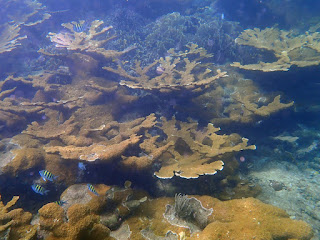 |
| Healthy Acropora palmata near Zapatillas |
| sand diver: before and after |
 |
| urchin, brittlestars and sponge |
For me this has been a great cohort. We’ve worked as a group since April 2022, when students began presenting weekly readings on topics tropical, Panamanian, and marine. Over summer, five pairs of students planned their field-based research projects for our time in Bocas. Student research projects explored fish assemblages by habitat, damsel behavior toward juvenile models, biology of marine debris, mangrove root communities and seagrass biology. All students have embraced this experience in Panama, worked together well, and developed new friendships.
 |
| A very large moon jelly or little people? |
The Smithsonian’s Bocas Research Station has been a great base from which to work and study. All of the BRS staff have worked as hard as our students to make our visit productive, rich, and safe. We thank the BRS staff for making things move along so well. Lastly, we also thank the Tom and Carol Williams Fund at the U Oregon for supporting our course since 2013. With this 5th offering we have now exhausted these funds by supporting students with financial need and purchasing supplies for the course activities and student research projects. After 5 offerings we have brought 43 students to Panama for a tropical marine experience!
 |
| Cleaner shrimp, Stenopus, at night |
Richard Emlet - Co-Instructor of Tropical Marine Biology in Panama
No comments:
Post a Comment